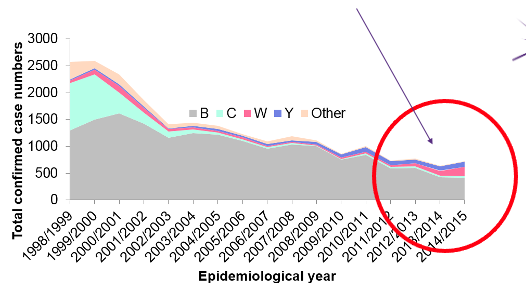
Vaccination programmes are constantly monitored to ensure they are protecting those who are at MOST risk at a CRITICAL time.
This is evident when we look at Group W meningococcal infection.
Alarmingly, we can see from this graph that over the past few years cases of meningococcal W (MenW) disease have risen steeply year on year in England and Wales. In 2014/15 MenW accounted for 24% of cases of meningococcal disease compared to only 1 – 2 % in 2008/9.
Genome Library
The meningococcal genome library, originally funded by MRF has played a vital part in helping Public Health England to stay a step ahead of the game in the fight against meningococcal disease.
Analysis of MenW isolates in the genome library has revealed that almost all of the increase in MenW disease is attributable to a particularly virulent strain of group W meningococcal bacteria called ST-111.
The ST-11 strain is associated with severe illness which often requires treatment in intensive care and has a higher associated death rate than other strains of meningococcal disease, (13% case fatality compared to 5-10%).
The rise in this ST-11 strain is particularly alarming because it is striking mainly healthy people across all age groups, with a marked spike amongst teenagers and cases are rising steeply. 22 cases were reported in 2009 compared with over 200 cases in 2016.
Diseases change
- Vaccines gives excellent protection, but cannot yet prevent all forms of meningitis and septicaemia
- Remain vigilant about signs and symptoms
- Remember that anyone of any age can contract meningitis and septicaemia
- The earlier the treatment, the better the outcome. If someone presents to you with symptoms it is vital you call for medical help
